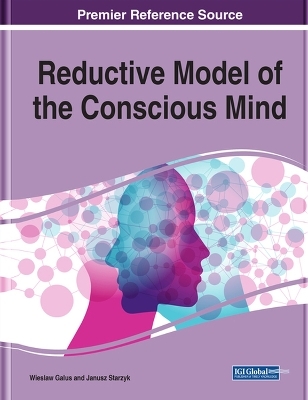
Reductive Model of the Conscious Mind
Seiten
2020
Business Science Reference (Verlag)
978-1-7998-5653-5 (ISBN)
Business Science Reference (Verlag)
978-1-7998-5653-5 (ISBN)
Identifies processes that are the essence of conscious thinking and place them in the imagined, simplified structure of cells able to memorize and transmit information in the form of impulses, which they call neurons. The purpose of the study is to explain the essence of consciousness to the degree of development of natural sciences.
Research on natural and artificial brains is proceeding at a rapid pace. However, the understanding of the essence of consciousness has changed slightly over the millennia, and only the last decade has brought some progress to the area. Scientific ideas emerged that the soul could be a product of the material body and that calculating machines could imitate brain processes. However, the authors of this book reject the previously common dualism-the view that the material and spiritual-psychic processes are separate and require a completely different substance as their foundation.
Reductive Model of the Conscious Mind is a forward-thinking book wherein the authors identify processes that are the essence of conscious thinking and place them in the imagined, simplified structure of cells able to memorize and transmit information in the form of impulses, which they call neurons. The purpose of the study is to explain the essence of consciousness to the degree of development of natural sciences, because only the latter can find a way to embed the concept of the conscious mind in material brains. The book is divided into three parts. Part 1 works to convince readers that the emergence of consciousness does not require detailed knowledge of the structure and morphology of the brain, with the exception of some specific properties of the neural network structure that the authors attempt to point out. Part 2 proves that the biological structure of many natural brains fulfills the necessary conditions for consciousness and intelligent thinking. Similarly, Part 3 shows the ways in which artificial creatures imitating natural brains can meet these conditions, which gives great hopes for building artificially intelligent beings endowed with consciousness. Covering topics that include cognitive architecture, the embodied mind, and machine learning, this book is ideal for cognitive scientists, philosophers of mind, neuroscientists, psychologists, researchers, academicians, and advanced-level students. The book can also help to focus the research of linguists, neurologists, and biophysicists on the biophysical basis of postulated information processing into knowledge structures.
Research on natural and artificial brains is proceeding at a rapid pace. However, the understanding of the essence of consciousness has changed slightly over the millennia, and only the last decade has brought some progress to the area. Scientific ideas emerged that the soul could be a product of the material body and that calculating machines could imitate brain processes. However, the authors of this book reject the previously common dualism-the view that the material and spiritual-psychic processes are separate and require a completely different substance as their foundation.
Reductive Model of the Conscious Mind is a forward-thinking book wherein the authors identify processes that are the essence of conscious thinking and place them in the imagined, simplified structure of cells able to memorize and transmit information in the form of impulses, which they call neurons. The purpose of the study is to explain the essence of consciousness to the degree of development of natural sciences, because only the latter can find a way to embed the concept of the conscious mind in material brains. The book is divided into three parts. Part 1 works to convince readers that the emergence of consciousness does not require detailed knowledge of the structure and morphology of the brain, with the exception of some specific properties of the neural network structure that the authors attempt to point out. Part 2 proves that the biological structure of many natural brains fulfills the necessary conditions for consciousness and intelligent thinking. Similarly, Part 3 shows the ways in which artificial creatures imitating natural brains can meet these conditions, which gives great hopes for building artificially intelligent beings endowed with consciousness. Covering topics that include cognitive architecture, the embodied mind, and machine learning, this book is ideal for cognitive scientists, philosophers of mind, neuroscientists, psychologists, researchers, academicians, and advanced-level students. The book can also help to focus the research of linguists, neurologists, and biophysicists on the biophysical basis of postulated information processing into knowledge structures.
| Erscheinungsdatum | 01.09.2020 |
|---|---|
| Reihe/Serie | InfoSci-Books - Copyright 2021 |
| Sprache | englisch |
| Maße | 216 x 279 mm |
| Gewicht | 633 g |
| Themenwelt | Geisteswissenschaften ► Psychologie ► Allgemeines / Lexika |
| Geisteswissenschaften ► Psychologie ► Biopsychologie / Neurowissenschaften | |
| Informatik ► Theorie / Studium ► Künstliche Intelligenz / Robotik | |
| ISBN-10 | 1-7998-5653-4 / 1799856534 |
| ISBN-13 | 978-1-7998-5653-5 / 9781799856535 |
| Zustand | Neuware |
| Haben Sie eine Frage zum Produkt? |
Mehr entdecken
aus dem Bereich
aus dem Bereich
Buch | Softcover (2024)
REDLINE (Verlag)
20,00 €
Eine kurze Geschichte der Informationsnetzwerke von der Steinzeit bis …
Buch | Hardcover (2024)
Penguin (Verlag)
28,00 €


